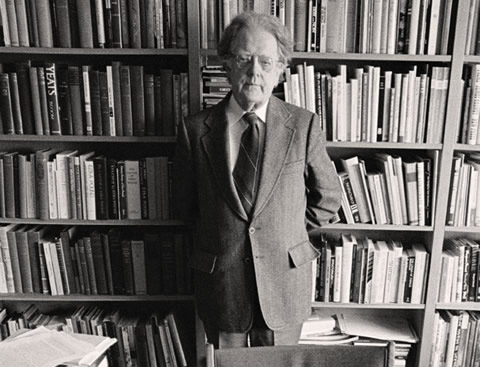Two years before Northrop Frye’s death in 1991, writer and editor Michael Todd interviewed the renowned literary scholar for an article about men’s libraries. Todd also spoke with other Canadian cultural figures, but says “Frye was the best really. He was very entertaining.” The article was never published, but the part about Frye is reproduced here.
If you pass by the door of Northrop Frye’s office at the University of Toronto, you might hear the sound of books being shredded. Frye says it’s the only way to outwit an overzealous cleaning staff.
“If I don’t rip them up and toss them into the trash, the cleaners fish them out and put them back on my desk.… I’m constantly pulling out books and having symbolic bonfires. It amazes me sometimes that I have so little regard for them.”
Those he doesn’t destroy he keeps in one of his three libraries: one at home (which includes a collection of classical music scores) and two at his university offices. Those are enough.
“When I was young and doing research for my book on Blake [Fearful Symmetry], I found most of the books on him were junk – with maybe two exceptions. The problem isn’t how to get hold of information; it’s how to get rid of it. But I guess if I was a proper scholar I would visit [libraries] more often.”
Although his books are neatly arranged on shelves throughout his North Toronto home, he doesn’t really believe in the clichéd ideal of the gentleman’s library. “Mine is always changing, depending on what I’m interested in. I usually arrange my books by topic – some philosophy here, biography there and so on. The Bible materials are downstairs, and my own books upstairs.”
Curiously, while books such as The Educated Imagination are here in his office (translated into Japanese), his own biography is not. “It’s one thing I don’t have a copy of,” says Frye.
As a product of a strict Methodist upbringing, Frye says his reading habits were more a matter of course than design. “There wasn’t much else you were allowed to do on Sundays,” he says. He was reading by age three, and fluently by six. The result was he found much of public school boring, having read most of the books already. Comic books were part of his early library along with “lots of trash” from the Boy’s Own series. “They seemed to concentrate almost exclusively on caning and floggings rendered in gruesome detail.”
Does he have many books on his “must read” list? “Oh yes, but the one nice thought about growing old is that you know you’ll never have time.”
Recent Posts
People Worry That AI Will Replace Workers. But It Could Make Some More Productive
These scholars say artificial intelligence could help reduce income inequality
A Sentinel for Global Health
AI is promising a better – and faster – way to monitor the world for emerging medical threats
The Age of Deception
AI is generating a disinformation arms race. The window to stop it may be closing




